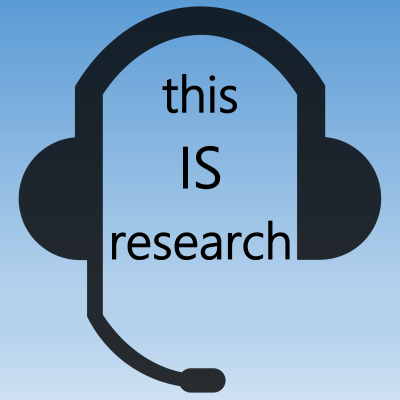
this IS research
Podcast de Nick Berente and Jan Recker
Empieza 7 días de prueba
$99 / mes después de la prueba.Cancela cuando quieras.

Más de 1 millón de oyentes
Podimo te va a encantar, y no estás solo/a
Valorado con 4,7 en la App Store
Acerca de this IS research
Professors Nick Berente from the University of Notre Dame and Jan Recker from the University of Hamburg talk about current and persistent topics in information systems research, a field that explores how digital technologies change business and society. You can find papers and other materials we discuss in each episode at http://www.janrecker.com/this-is-research-podcast/.
Todos los episodios
102 episodiosA new season of podcast episodes is starting and what better place to kick it off as the world’s largest business and management conference. We are recording this episode at in beautiful Copenhagen, made possible through a generous invite from who organized a recording studio for us. Being here amid symposia, professional development workshops, panels, and paper presentations makes us wonder: what does it take to produce great, stimulating, and productive academic discourse? Does it depend on the people that get invited to speak, is it about their ideas, or what else? We sit down with our friend with whom we share some stories from the events we’ve attended at AOM and we distil a few rules that characterize good intellectual debate: let there be cognitive conflict about the merit of ideas, be bold enough to propose new ideas, show humility for the craft and work of others, and be respectful to your colleagues. Episode reading list Kulkarni, M., Mantere, S., Vaara, E., van den Broek, E., Pachidi, S., Glaser, V. L., Gehman, J., Petriglieri, G., Lindebaum, D., Cameron, L. D., Rahman, H. A., Islam, G., & Greenwood, M. (2024). The Future of Research in an Artificial Intelligence-Driven World. Journal of Management Inquiry, 33(3), 207-229. Brynjolfsson, E., Collis, A., Diewert, W. E., Eggers, F., & Fox, K. J. (2025). GDP-B: Accounting for the Value of New and Free Goods. American Economic Journal: Macroeconomics, . Stelmaszak, M., Wagner, E., & DuPont, N. N. (2024). Recognition in Personal Data: Data Warping, Recognition Concessions, and Social Justice. MIS Quarterly, 48(4), 1611-1636. Habermas, J. (1984). Theory of Communicative Action, Volume 1: Reason and the Rationalization of Society. Heinemann. Lehmann, J., Hukal, P., Recker, J., & Tumbas, S. (2025). Layering the Architecture of Digital Product Innovations: Firmware and Adapter Layers. Journal of the Association for Information Systems, 26, .
Is there collusion in our field? Do we have elites running wild, making sure that their work gets published whilst the rest of us struggles to find room to publish our own work? And are we handling conflicts of interest that may exist between authors and the editors who are charged with making decisions about their work? These are serious questions. They target the core of our field, they have the potential to undermine – or bolster – the legitimacy of all our scholarship, and they pose serious material consequences for all scholars, their careers and ultimately their lives. We came across a new paper that reports an analysis of the potential conflict of interest issues in academic publishing, and we use this paper to reflect on our experiences as both authors and editors. We try to draw a few conclusions and recommendations about how we can raise awareness and build institutional trust to minimize if not avoid any questionable or outright unethical practices in publishing. Episode reading list Association for Information Systems. AIS Podcast Library, . Mindel, V., & Ciriello, R. (2025). Safeguarding Academic Legitimacy: Editorial Conflicts of Interest as a Principal-Agent Problem in Elite Business Journals. SSRN, . Recker, J., Rosemann, M., Green, P., & Indulska, M. (2011). Do Ontological Deficiencies in Modeling Grammars Matter? MIS Quarterly, 35(1), 57-79. Lee, J., & Berente, N. (2012). Digital Innovation and the Division of Innovative Labor: Digital Controls in the Automotive Industry. Organization Science, 23(5), 1428-1447. Kane, G. C., Young, A., Majchrzak, A., & Ransbotham, S. (2021). Avoiding an Oppressive Future of Machine Learning: A Design Theory for Emancipatory Assistants. MIS Quarterly, 45(1), 371-396. Grisold, T., Berente, N., & Seidel, S. (2025). Guardrails for Human-AI Ecologies: A Design Theory for Managing Norm-Based Coordination. MIS Quarterly, . Boh, W., Melville, N. P., Baptista, J., Chasin, F., Horita, F., Ixmeier, A., Johnson, S. L., Ketter, W., Kranz, J., Miranda, S. M., Nan, N., Pentland, B. T., Recker, J., Sadeghi, S., Sarker, S., Sarker, S., Sutanto, J., Wang, P., & Wilopo, W. (2025). Digital Resilience for the Climate Crisis: Theoretical Perspectives and Ideas for Future Information Systems Research. MIS Quarterly, forthcoming. Merton, R. K. (1968). The Matthew Effect in Science. Science, 159(3810), 56-63. Tiwana, A., & Safadi, H. (2025). Silence Inside Systems: Roots and Generativity Consequences. Information Systems Research, . Li, J., Li, M., Wang, X., & Thatcher, J. B. (2021). Strategic Directions for AI: The Role of CIOs and Boards of Directors. MIS Quarterly, 45(3), 1603-1643. Pienta, D., Vishwamitra, N., Somanchi, S., Berente, N., & Thatcher, J. B. (2025). Do Crowds Validate False Data? Systematic Distortion and Affective Polarization. MIS Quarterly, 49(1), 347-366.
Which research methods are better, quantitative or qualitative? What is more important, getting a richer picture of what goes on in organizations, or seeking generalizable insights about causality? This debate has raged at the very least since Glaser and Strauss popularized the grounded theory method in the mid twentieth century. In 2025, we want to put this debate to rest. We asked one of the best econometric scholars we know () and one of the best qualitative scholars we know () to fight this debate on air and come up with their very own end-of-all arguments. The result? It may surprise you: We all ought to get mad. Episode reading list Chang, H. (2008). Inventing Temperature: Measurement and Scientific Progress. Oxford University Press. Burtch, G., Carnahan, S., & Greenwood, B. N. (2018). Can You Gig It? An Empirical Examination of the Gig Economy and Entrepreneurial Activity. Management Science, 64(12), 5497-5520. Greenwood, B. N., Kobayashi, B. H., & Starr, E. P. (2025). Can You Keep a Secret? Banning Noncompetes Does Not Increase Trade Secret Litigation. SSRN, . Kraemer, K. L., Dickhoven, S., Tierney, S. F., & King, J. L. (1987). Datawars: The Politics of Modeling in Federal Policymaking. Columbia University Press. Roth, J., Sant'Anna, P. H. C., Bilinski, A., & Poe, J. (2023). What’s Trending in Difference-in-Differences? A Synthesis of the Recent Econometrics Literature. Journal of Econometrics, 235(2), 2218-2244. Matherly, T., & Greenwood, B. N. (2024). No News is Bad News: The Internet, Corruption, and the Decline of the Fourth Estate. MIS Quarterly, 48(2), 699-714. Levitt, S. D., & Dubner, S. J. (2005). Freakonomics: A Rogue Economist Explores the Hidden Side of Everything. William Morrow. Greenwood, B. N., & Wattal, S. (2017). Show Me the Way to Go Home: An Empirical Investigation of Ride-Sharing and Alcohol Related Motor Vehicle Fatalities. MIS Quarterly, 41(1), 163-187. King, A. A. (2025). Does Corporate Social Responsibility Increase Access to Finance? A Commentary on Cheng, Ioannou, and Serafeim (2014). Strategic Management Journal, forthcoming. . Seidel, S., Frick, C. J., & vom Brocke, J. (2025). Regulating Emerging Technologies: Prospective Sensemaking through Abstraction and Elaboration. MIS Quarterly, 49(1), 179-204. Pentland, B. T. (1999). Building Process Theory with Narrative: From Description to Explanation. Academy of Management Review, 24(4), 711-725. Lee, J., & Berente, N. (2013). The Era of Incremental Change in the Technology Innovation Life Cycle: An Analysis of the Automotive Emission Control Industry. Research Policy, 42(8), 1469-1481. Anderson, P., & Tushman, M. L. (1998). Technological Discontinuities and Dominant Designs: A Cyclical Model of Technological Change. Administrative Science Quarterly, 35(4), 604-633. Brynjolfsson, E., & Hitt, L. M. (1996). Paradox Lost? Firm-Level Evidence on the Returns to Information Systems Spending. Management Science, 42(4), 541-558. Noe, R. (2025). Moral Incoherence During Category Emergence: The Contentious Case of Connected Toys. Harvard Business School Working Paper, 24-071, .
We continue with our special “Ask us anything” episode to celebrate the centenary of the This IS Research podcast. This time, we handle questions such as “do we have to worry about ontology?" - No; "should we engage in community building?" Yes; and “what have you learned from the podcast?” A whole lot - and we hope you have learned a thing or two along the way as well. Episode reading list Meyer, J. W., & Rowan, B. (1977). Institutionalized Organizations: Formal Structure as Myth and Ceremony. American Journal of Sociology, 83(2), 340-363. James, W. (1907). Pragmatism: A New Name for Some Old Ways of Thinking. Hackett Publishing. Gal, U., Berente, N., & Chasin, F. (2022). Technology Lifecycles and Digital Innovation: Patterns of Discourse Across Levels of Abstraction: A Study of Wikipedia Articles. Journal of the Association for Information Systems, 23(5), 1102-1149. Faik, I., Barrett, M., & Oborn, E. (2020). How Information Technology Matters in Societal Change: An Affordance-Based Institutional Perspective. MIS Quarterly, 44(3), 1359-1390. Leonardi, P. M. (2010). Digital Materiality? How Artifacts Without Matter, Matter. First Monday, 15(6), . Goebeler, L., Hukal, P., & Xiao, X. (2024). Four Roles of Physicality in Digital Innovation: A Theoretical Review. Journal of Strategic Information Systems, 33(4), 101862. Faulkner, P., & Runde, J. (2019). Theorizing the Digital Object. MIS Quarterly, 43(4), 1279-1302. Dwivedi, Y. K., Kshetri, N., Hughes, L., Slade, E. L., Jeyaraj, A., . . . Wright, R. T. (2023). "So what if ChatGPT wrote it?” Multidisciplinary Perspectives on Opportunities, Challenges and Implications of Generative Conversational AI for Research, Practice and Policy. International Journal of Information Management, 71, 102642.
We have an anniversary to celebrate: one hundred episodes of the This IS Research podcast. We mark the occasion by answering questions we received from our audience: Which bear is the best, who likes a hug more... and what advice would we give about starting as an assistant professor, pivoting your research, and what books to read. All this and much more in part one of our “ask us anything” episode. Episode reading list Fort, T. (2003). The Book of Eels. HarperCollins. Nazar, S. (1999). A Beautiful Mind. Simon & Schuster. Frankl, V. E. (1946). Man’s Search for Meaning. Beacon Press. Ashby, W. R. (1956). An Introduction to Cybernetics. Chapman & Hall. Card, O. S. (1985). Ender’s Game. Tor Books. Beer, S. (1974). Designing Freedom. CBC Learning Systems. Simon, H. A. (1947). Administrative Behavior: a Study of Decision-Making Processes in Administrative Organization. Macmillan. Newell, A., & Simon, H. A. (1972). Human Problem Solving. Prentice-Hall. March, J. G., & Simon, H. A. (1958). Organizations. John Wiley & Sons. Urquhart, C., Berente, N., Recker, J. (2021). Naughty Grounded Theory. . Zwass, V., Berente, N., Recker, J. (2023). Never create a journal unless it is JMIS. . Berente, N., Recker, J. (2022). Why we love what we do. .

Valorado con 4,7 en la App Store
Empieza 7 días de prueba
$99 / mes después de la prueba.Cancela cuando quieras.
Podcasts exclusivos
Sin anuncios
Podcast gratuitos
Audiolibros
20 horas / mes























